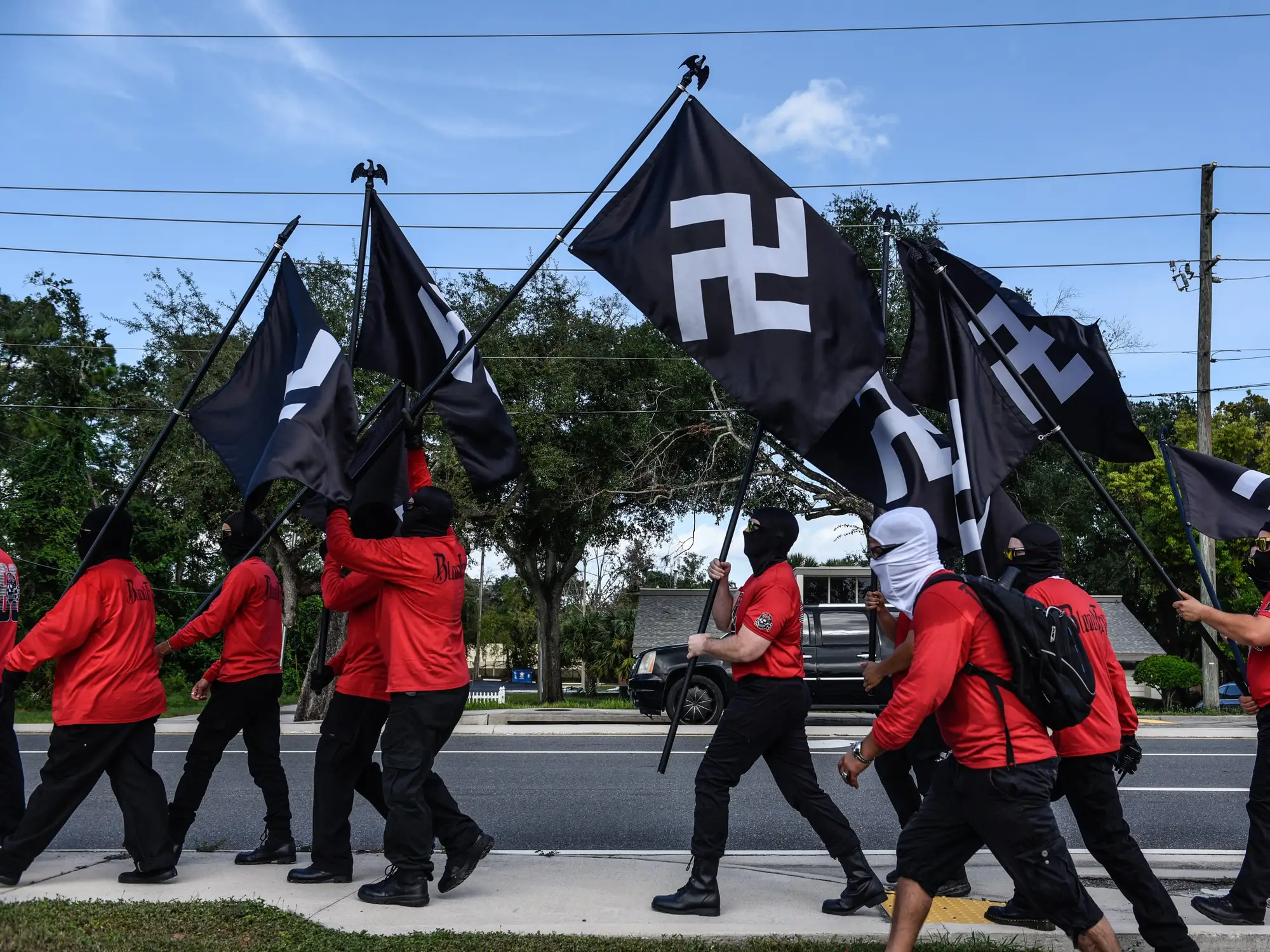A chain of unprecedented hate spread throughout Florida
By Mirabel Ge ’27
Several Neo-Nazi gatherings have occurred in Florida in the past few months, worrying government officials and locals. According to the Anti-Defamation League, on June 10th, a group of 18 protesters gathered outside of the Orlando Disney World, spewing anti-semitic, white supremacist, and anti-LGBTQ+ messages. This violent group raised posters with swastikas, relentlessly shouted slurs, and displayed Nazi salutes. A larger rally consisting of 50 extremists was held in the Orlando suburbs in Altamonte Springs, Rolling Stone says. These radical rallies shocked many, as their magnitude was unprecedented. The rallies demonstrate the threat to peace and security that small extremist groups pose to tourists and local residents. Moreover, neo-Nazi marches and anti-semitic displays have increased since the war between Israel and Hamas. These rallies drew attention to Ron DeSantis, 46th governor of Florida and 2024 GOP nominee candidate, who has sometimes responded to such tragedies with inaction and silence. Increasingly common hate crimes have been exacerbated by recent bills passed and policies supported by Florida’s governor.
On May 8th, DeSantis signed multiple bills banning public colleges and universities from spending state funds on diversity, equity, and inclusion (DEI) programs, including critical race theory courses. He has also been known throughout his political career to support anti-woke movements. DeSantis stated in a press conference: “If you want to do things like gender ideology, go to Berkeley. For us with our tax dollars, we want to be on the classical mission of what a university is supposed to be.” DeSantis makes his ideology clear: restrict universities from spending money on inclusion programs because they do not align with the “classical” mission of universities. While this bill first claimed to enhance public higher education, it now seems like many liberal arts students who rely on these courses are stripped of their academic freedom. Furthermore, the lack of these programs makes a broader statement to BIPOC students and faculty who are a part of the public education system that their identities should not feel welcomed or included. Campus activities that advocate for diversity have all been prohibited. In an already disparate society, DeSantis’ decision threatens the feeling of security and belonging that minority groups might have gotten from participating in inclusion programs.
Many students have spoken out about their feelings of insecurity because of DeSantis’ policies. For example, former Floridian Jill Alie Hercule Espinal, now a freshman at UMass, tells the Massachusetts Daily Collegian that her educational experience began deteriorating after she entered high school. As a person of color in a predominantly white community, the conservative policies that were being passed were unpleasant for her. She felt alienated and like the censorship wormed its way through her experience and made her feel like she couldn’t express her more liberal opinions. DeSantis’policies are harming students and their feeling of safety within schools, a place that should be an open place to express their opinions. According to ABC News, Nailah Summers, a leader of the Dream Defenders, a group of Black and brown anti-racism activists: “ [Ron DeSantis] is banning books and flags in classrooms everywhere. He’s making sure our history isn’t getting taught. He’s getting rid of teachers, professors, and faculty that look like us and support us.”
DeSantis has previously been known for working with the state to combat anti-semitism by passing bills, but as of October 28th, he has not publicly addressed the multiple neo-Nazi hate rallies that have taken place. His refusal to condemn these problematic occurrences makes him equally complicit in such hateful actions. DeSantis has not given this issue enough attention, hence causing more and more rallies going unpunished. His insistence on eliminating diversity programs to “ensure higher education” is a display of indifference for many marginalized communities. Coupled with dodging the problem of neo-Nazi gatherings, DeSantis’ silence speaks volumes about what he truly supports. Even one of DeSantis’ closest Jewish allies, Randy Fine, wrote in a column in the Washington Times that he was “jumped by a Nazi” in “DeSantis’ Florida,” and that DeSantis’ lack of confrontation had “broken my heart.” In an interview with The New York Times, Fine expresses his disappointment in DeSantis’ “lack of leadership” after the neo-Nazio marches. While the governor of Florida has made clear before that he does not support anti-semitism, he has not taken appropriate action in combating it.
DeSantis has been known for his contentious support of anti-inclusion programs. Consequences have begun to manifest themselves in more extreme forms: hate rallies and, recently, neo-Nazi gatherings. While these neo-Nazi gatherings have threatened the safety of many local Florida residents, DeSantis has taken an idle stance in such an important matter, which might be even more alarming than the rallies themselves. Representatives have the responsibility to make decisions in the best interest of the people, and the governor of Florida’s inaction has only exacerbated the hate rallies.



